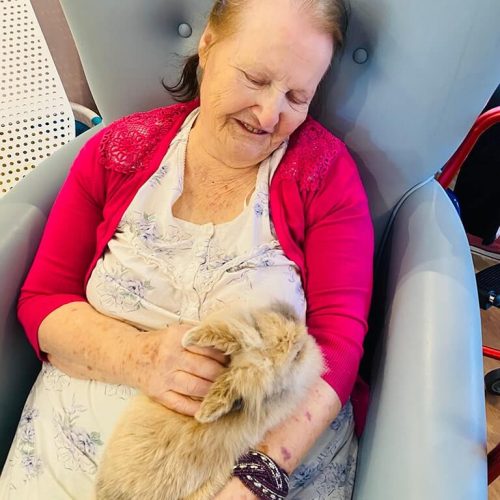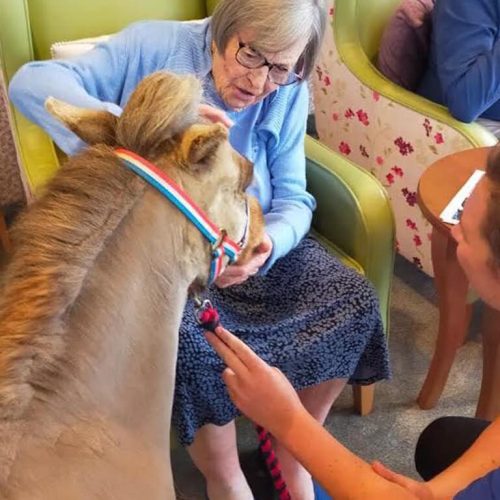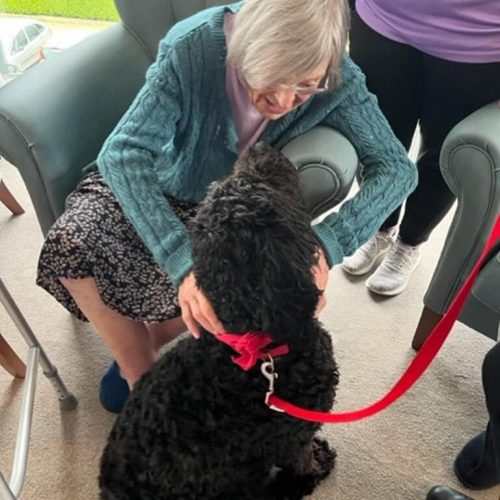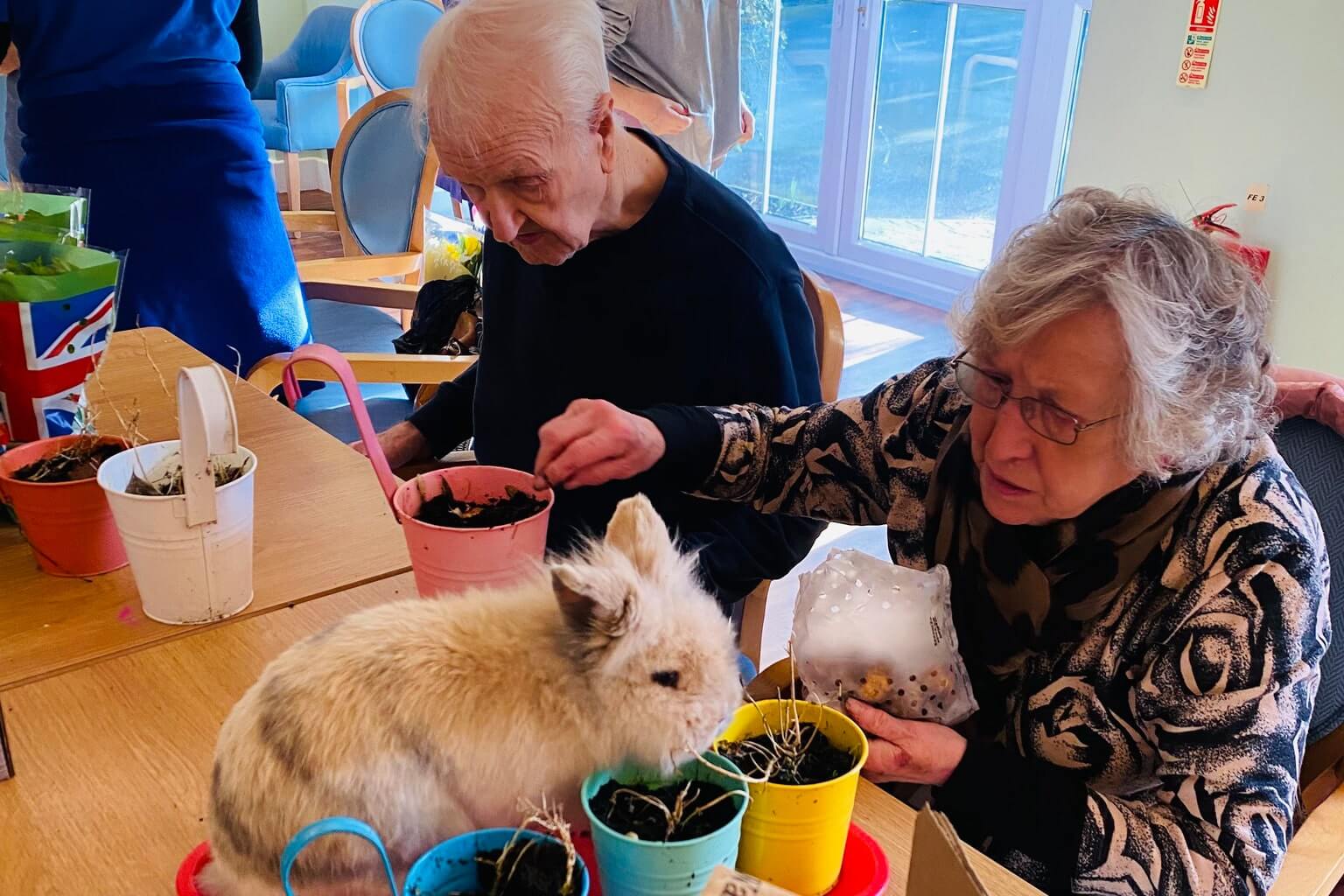For most people, animals spark a moment or lifetime of joy, and this is no different for those living with dementia. In recent years, there has been significant research into animal therapy in dementia care because activities around pets and animals have been shown to increase the well-being of those living with the disease in a number of ways.
Following the research, dementia care homes, such as ours, have loved including animal therapy as part of their activities programme and have embraced welcoming a range of animals, from alpacas to miniature ponies and dogs to the home.
So, what are the benefits of animal therapy in dementia care? Does it really make a difference to your loved one in a care home? In this article, we delve into why animal therapy is becoming an important part of dementia care and how it is making a difference in the lives of those living at our care homes.
Improved Mood
Studies have shown that animal-related activities reduce anxious feelings and sadness and increase positive emotions. This is pivotal for combatting depression, which is a common emotion experienced by those living with dementia.
When living with dementia, the world around you is constantly changing due to the deterioration of the disease. This can make life unnerving and sometimes overwhelming. Having a pet or engaging in activities with a pet often allows your loved one to find some comfort and reassurance, giving them a moment of happiness and relief.
Calming Effect
Animal therapy in dementia care has been proven to create a calming effect on those living with the disease, both physically and mentally.
A study conducted in 2008 showed that animal therapy reduced blood pressure for those with dementia while helping them relax and calm down, creating a tranquil atmosphere within the nursing home and between residents.


Reduction In Behavioural Problems
Symptoms of dementia can often include behaviour of concern. This is understandable when you consider that your loved one is losing the ability to be independent and is unable to recognise those around them, causing them to feel anxious, confused and frustrated. However, animal therapy in dementia care has demonstrated a drop in these outbursts and behavioural problems.
Animals have been shown to reduce the negative feelings linked to living with dementia, which in turn reduces behaviour of concern.
Interacting with an animal will often become a person’s favourite part of the week as they look forward to the laughter and love that are experienced.
Increased Social Interaction
Setting up regular group animal therapy sessions within a care home is a great way to encourage social interaction between residents.
Isolation is one of the biggest risks for those living with dementia as it can be an easier way to manage symptoms and feelings they are experiencing. However, if your loved one looks forward to participating in animal therapy, it will ensure that they interact not just with the animal, but with others also partaking in the therapy session. Social interaction will decrease the likelihood that your loved one feels isolated, reducing the chance of depression and increasing confidence, self-esteem and overall well-being.
Additionally, even if visiting infrequently, animals are companions and offer a source of company.
Increased Physical Activity
Whether your loved one is bed-bound, chairbound or fairly physically able, animal therapy will help to promote physical activity and personal movement.
For those in bed or a chair, any visits from animals can encourage arm movements as they reach out to touch and pet the animals. If the activity involves a dog, there is also the chance to play fetch (space allowing) encouraging your loved one to use their arm to throw the ball or toy.
Loved ones who are slightly more able might be able to walk around with the animal, perhaps walking the dog around the care home’s gardens.
Physical activity, no matter how small is known to improve mental health, which is why animal therapy can be an incredibly important part of dementia care because it encourages movements that each resident is able to do.
Improved Nutrition
While not a direct impact of animal therapy in dementia care, increased nutrition is an incredible benefit of including animal therapy in dementia care.
It is clear that activities surrounding animals have a remarkable and positive impact on those living with dementia, boosting their mood, reducing depression and helping them feel calm. With an increased sense of well-being, residents living with dementia are more likely to eat.
We all know the feeling of sadness or anxiety and its impact on our appetites, those living with dementia also experience this, therefore utilising animal therapy to increase social interaction and happy emotions helps create a healthy appetite and reduce the likelihood of them neglecting their nutrition.

Animal Therapy at LuxuryCare
As dementia care specialists, we have seen first-hand the impact that animal therapy in dementia care can have on those living with the disease.
As a team that is passionate about promoting independence, engagement and positive well-being, we often include animal therapy within our activity programmes. We have been known to welcome alpacas into our home, which brought our residents together to share laughter and stories.
Our values centre around empowering the people within our care to live an independent and fulfilling life. With a team of highly-trained staff and a support network of relevant professional services, we are proud to offer a range of care including residential care, palliative care general nursing care and respite care that prioritises individual care plans, independence and engagement.
There are many reasons why those looking for a care home for their loved one choose Luxury Care. From animal therapy to day trips out, to our range of comfortable and well-equipped rooms and facilities, we are a home away from home for your loved one.
Discover how we can care for your loved one by booking a consultation online. Alternatively, visit our homes to see the compassionate care we provide first-hand. Call us on 01202 292796 today.





















